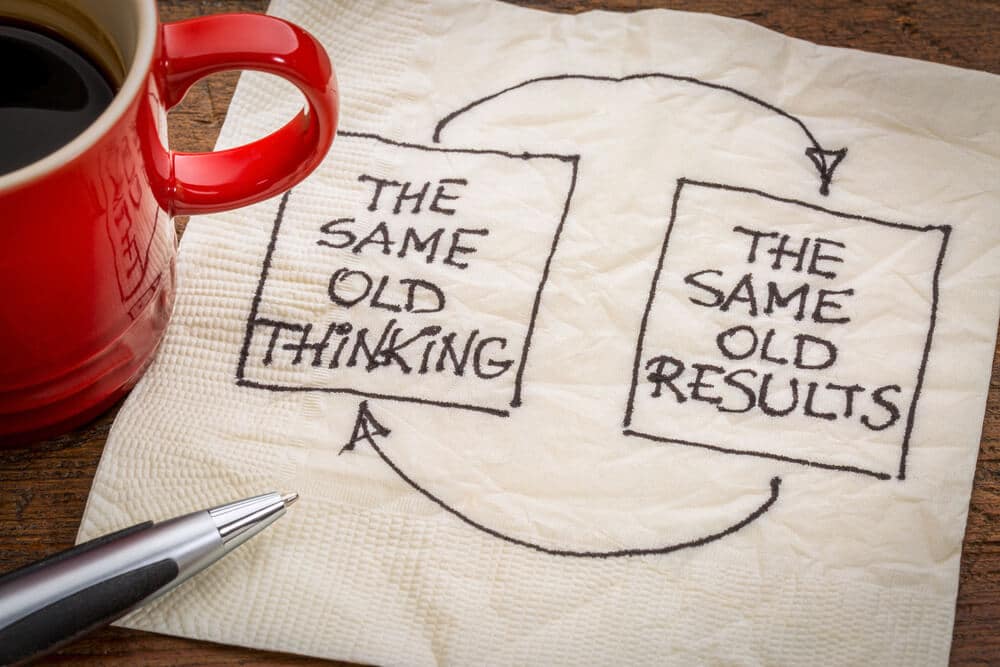Shift to a new level of thinking

Shift to a new level of thinking with these three lessons
Goals are like dreams - future images we set for ourselves - to help us become more than what we were.
But it requires the right approach and a shift to a new level of thinking.
In this article I break down three paradigm shifts that can help you think different and thus get different results.
Shift #1. Transform Motivation into Momentum
Motivation is defined as your willingness to do something. To be motivated simply means you sufficiently crave the reward to put in the effort. This creates a positive reinforcing cycle that draws you to express a certain behaviour.
This usually happens when we set a new goal. We suddenly feel this motivation and want to work on it. We can view it as a magical ingredient - but unfortunately it won't always be present and it will fade away over time.

In other words, it's easy to do something when we feel motivated in a certain moment. But what about the future? What about those moments where we know we will not have that inner source of power to take action?
Maybe taking the first step is easy.. But what about the second and third step?
Following through when things don't go your way?
When obstacles prevent you from going forward?
The solution is to create momentum instead.
With momentum, we keep going by knowing our pitfalls and making sure we remain on the right course in times of low motivation.
So it is a misconception that motivation is necessary to act. Similar to the snow-ball effect, you can actually gain momentum and speed over time if you ensure you take care of the first steps. It's up to you to create that momentum.
Shift #2. Prioritize Consistency over Intensity
We all want to achieve grand things in a short time. But we forget that life is a marathon, not a sprint. So you have to treat it as one as well.

The problem is that we can be addicted to sprints of intensity. Perhaps it is because there is no shortage of information, freedom or choice, so we can pursue any passion or interest. Maybe it is due to the innate desire that we want to live in a free and overloaded-with-choices-world. As a result of this 'need for choice', we never seem to commit to anything and stick to it.
But the only limiting factor however is time. So we think have to do things fast, because there is no time to take it slow.
This makes the quest for novelty preferred over consistency, because consistency isn't glamorous or exciting. But this does truly generate more results over the long term?
The differences between a sprint and a marathon.
With a sprint of intensity, the end is in sight. It's about strength and energy. Conversely, with a marathon the goal is a long haul. It involves twisting and turning with ups and downs. It's more about stamina than strength.
In a sprint, the competition is mostly with others - comparing fastest times. However, completing a marathon creates much more satisfaction for finishing it - contrary to a sprint which is only satisfying when you win it. In this case, the competition is only with yourself and the ability to enjoy the process of all of it.
This is the difference between a do-or-perish attitude, or one that focuses on the satisfaction of the whole race.
Don't sprint the marathon.
Of course it is important to keep your sight on certain milestones. But more important is to focus on consistent results that compound over time.
Success is not always about greatness. It’s about consistency. Consistent hard work leads to success. Greatness will come.
- Dwayne Johnson
When you carve out the time for something on a regular basis, the process becomes more important than the result. And the system is what ultimately defines the quality, shape and direction of your life.

Of course there might be one bad day in between, but the consistency is all that matters. The rising line of daily practice will help you shift to a new level of thinking:
“It’s not what we do once in a while that shapes our lives. It’s what we do consistently.”
- Anthony Robbins
Shift #3. Remove Retreat and focus on Advancement
The third old thinking mistake is to think that there is a way back to retreat.
Look. Following through is a mind game.
So we make it simple with a technique often used in conquest and battle:
In the third century BC, there was a general named Xiang Yu who sent his army to conquer the Qin Dynasty. When his army was resting, he ordered the burning of their ships so that they would have no choice to go back. He simplified the decision for his army; either you win or die.

When you take away the choice of retreating, advancing becomes your only option in your mind. The less freedom you have in making a choice, the easier it becomes. Essentially, reducing 'free' decisions in your life also decreases the energy you need to actually do what you contemplated to do in the first place. When things cannot be changed or influenced, we often accept it and move on with our lives.
Creating an allegiance with yourself
There is a similar story about a Spanish conquistador Cortes, who was on an exploratory mission. A mutiny was imminent due to men who wanted to return to Cuba. So he needed a way to ensure the men were united.

Thus, he removed the option of retreat by sinking his own ships on the east coast of Mexico. As a result, he sealed the fate of the men together, forcing their allegiance to conquer the Aztec city.
The message in both cases is clear; when there is no way to retreat, all you can do is take the road forward.
Similar in our own life, often it is not the action that fatigues us but the pondering of it. That's why we need to burn the ships, to make the road in front of us the only road we can take to move forward.
Which begs the question; how can we lock in certain choices? How can we eliminate moments of doubt so that we follow through?
Following through is 100% mental
Essentially, the resolve to follow through on your dreams is a mind game.
But that is not how we human work naturally. We prefer to keep options open as long as possible. So if we are not forced to make decisions, we leave those decisions undecided until a later time.
This irrationality is not helping us with goals we wish to achieve. We are reluctant to invest, eliminate, and cut through decisions when we don't have to. Because each decision costs mental energy. Each decision has an opportunity cost or a price tag.
However, we must learn to close doors for ourselves. Because if we can close doors, we can shift to a new level of thinking and commit to entering other doors. When we determine what not to pursue in life, it becomes clear on what we do want to pursue in life.
Creating your own ritual
Rituals, or pre-game routines are famously used by successful people. They know that motivation is something that cannot always be counted on. By creating a ritual, momentum is activated and amplified. Consistency is enforced because the ritual is always the same. The build-up is always the same. That's why they say not to change a routine that works. Put differently, following a ritual can help us shift to a new level of thinking.
Twyla Tharp, a dancer and choreographer and writer of the book The Creative Habit mentions how she uses her rituals:
I begin each day of my life with a ritual; I wake up
at 5:30 A.M., put on my workout clothes, my leg warmers, my sweatshirts, and my
hat. I walk outside my Manhattan home, hail a taxi, and tell the driver to take
me to the Pumping Iron gym at 91st street and First Avenue, where I workout for
two hours. The ritual is not the stretching and weight training I put my body
through each morning at the gym; the ritual is the cab. The moment I tell the
driver where to go I have completed the ritual.
It’s a simple act, but doing it the same way each morning habitualizes it — makes it repeatable, easy to do. It reduces the chance that I would skip it or do it differently. It is one more item in my arsenal of routines, and one less thing to think about.
Initiating the right behaviour
It seems that productivity and effort are not consequences of motivation and willpower but consistent and conscious practice of a schedule. Because when you create a ritual and maintain it, you will start moving into the right direction.
The magic is found in the simplicity of following the ritual. Focusing on overcoming inhibiting tactics and psychological roadblocks that will attack you on a daily basis. By dealing with procrastination and resisting emotional temptations, slowly but surely it becomes possible to shift to a new level of thinking.
When you shift to a new level of thinking...
When we shift to a new level of thinking there is no laziness or lack of discipline. It's the moment we choose to release fear of judgement and we start doing it for the sake of doing it. But it requires stripping ourselves for the need for perfection and sense of security. We should become aware and focus on creating the habits that will help us follow through.
So set fire to your ships. Make the desired choice the only choice to shift to a new level of thinking. Create the mental awareness and new doors will open to you. So you can step into a new future.


Comments are closed.